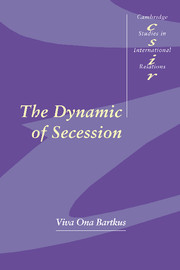Summary
The two central claims of this book can be briefly stated: that the distinct community's decision to secede can usefully be thought of as a function of its appraisal of its circumstances – in other words, the costs and benefits of both membership and secession, and that this appraisal is continuous. The implications of these claims are significant. First, independence for the distinct community has a relative, not absolute, value. Second, the decision to secede can be affected by changes in the circumstances in which the distinct community finds itself. The purpose of this concluding chapter is fourfold: to summarize the main arguments as to the reasons why groups secede, to draw out the implications of these arguments for the concept of sovereignty, to indicate some of the policies which may be effective in the prevention and resolution of secession crises, and finally, to speculate on the main factors which may affect future trends in secession.
Speculation as to future trends is a hazardous enterprise which scholars embark upon only at their peril. Nevertheless, such contemplation on the future of secession movements may be valuable, if only to crystalize the lessons from the preceeding analysis. As the Ibo, Bengali, Southern Sudanese, Norwegian, and other secession crises arising as “last resorts” or at “opportune moments” revealed, some secession attempts are a direct reaction to changes in official policies.
- Type
- Chapter
- Information
- The Dynamic of Secession , pp. 216 - 232Publisher: Cambridge University PressPrint publication year: 1999



